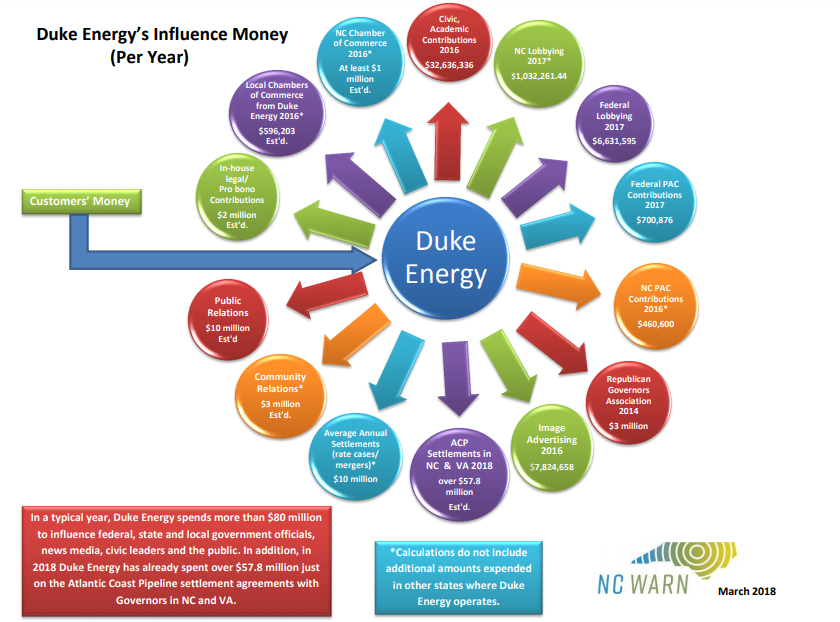Friends of the Earth joined NC WARN in a November 2018 petition to the NC Utilities Commission calling for a ban on pervasive influence spending by Duke Energy. The case has national ramifications for climate change, electricity rates and corporate control over government and civic leaders. In response, the Commission proposed rules in August 2019 that would prohibit Duke Energy’s public utilities from charging ratepayers for political contributions, charitable contributions and lobbying expenses. NC WARN and Friends of the Earth filed initial comments in response.
In August 2021, the Commission issued a final order strengthening rules and reporting requirements that keep utilities from recovering PR and lobbying expenditures from customers. Read news coverage by NC Policy Watch and the Energy News Network.
Our petition was based on an analysis we did in March 2018 that showed Duke spends $80 million a year in such influence spending.
Energy Justice NC has published a report on Duke Energy campaign donations and a Follow the Monopoly Money tool where you can see at a glance how much money each NC legislator has received from Duke.

Click to enlarge
Where we got the figures
Source material (Exhibit F of rulemaking petition)
Resources
On November 14, 2018, NC WARN and Friends of the Earth filed a petition for rulemaking, calling on the NC Utilities Commission to keep Duke Energy from spending customer money for influence spending.
In the news release announcing the petition, Michelle Chan, Vice President of Programs at Friends of the Earth, said: “Influence spending by energy corporations is a national epidemic that is polluting our democracy and driving the climate crisis. Duke Energy and other utilities are only concerned with growing their corporate profits by expanding the use of fracked gas and preventing cheaper, clean energy alternatives.”
The case was bolstered by the former Chairman of the New York Utilities Commission, Peter Bradford, who filed an affidavit describing utility influence spending as a long-running national problem, and he urged the NC Commission to take the lead in reining it in: “Given the harm demonstrably done by utility programs designed to further their influence over policymaking processes, the Commission should do all that it can within the framework of the First Amendment to assure that customers do not pay for these programs…”
NC WARN Executive Director Jim Warren added: “Duke Energy executives calculate that they must spend millions to keep their 20th Century business model going. They simply have to buy favor and stifle criticism of the corporation’s role in driving the climate crisis, its coal ash fiascos and constantly raising rates to build unneeded power plants and fracked gas infrastructure such as the Atlantic Coast Pipeline.”
In August 2021, the NC Utilities Commission issued a final order in the case, strengthening the rules for ensuring utility customers do not have to foot the bill for utility advertising and lobbying.






